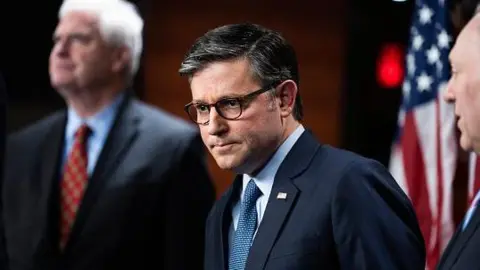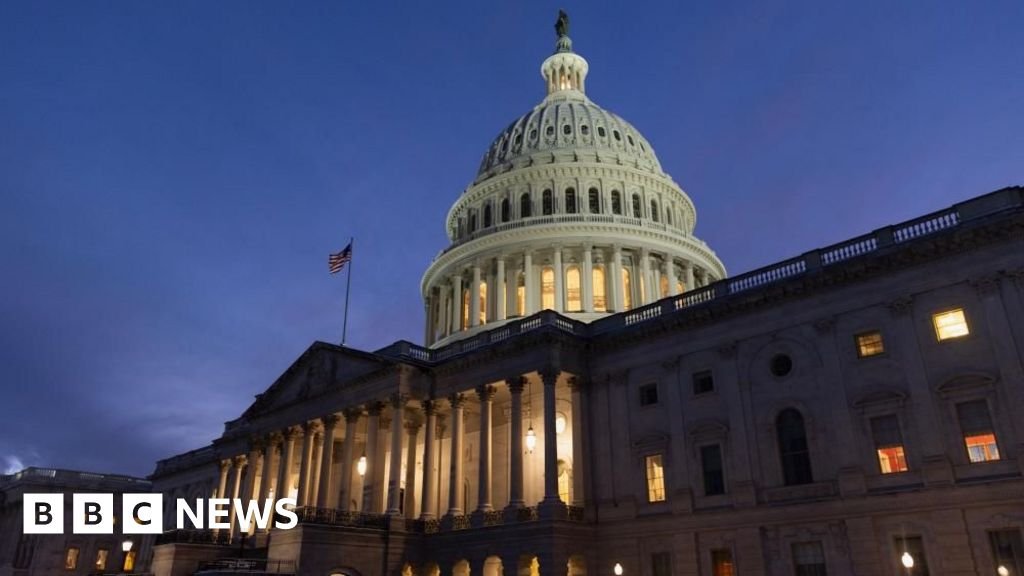 Getty Images
Getty ImagesThe U.S. House of Representatives has voted against a funding measure supported by Donald Trump, moving one step closer to a government shutdown this weekend.
A revised spending plan failed to achieve the required two-thirds majority in the lower house of Congress. 38 Republicans voted against the bill on Thursday evening, defying the president-elect.
Trump scuttled a previous bipartisan funding deal that Republican House leadership had reached with Democrats after tech billionaire Elon Musk voiced strong criticism of the measure.
After the bill failed by a vote of 174 to 235, Republican House Speaker Mike Johnson said he would present another solution before the midnight deadline on Friday.
The replacement bill approved by Trump would have tied government funding to a two-year suspension of the federal debt limit, which determines how much the state can borrow to pay its bills.
Here are five things to know about the potential government shutdown:
1. How we got here
The impending government shutdown can be traced back to September, when another budget deadline loomed.
Johnson failed to secure a six-month funding extension. Most Democrats voted against the extension, which included a measure (the SAVE Act) that required proof of citizenship to vote.
Instead, Congress reached a bipartisan agreement on a simple bill that would keep the government funded through December 20th.
Johnson promised at his Republican conference next December, when the funding runs out, that they wouldn’t have to vote before the holiday break on a spending bill that required anything but the kitchen sink.
But when congressional leaders released the text of the latest spending bill on Tuesday, three days before lawmakers were scheduled to recess for the holiday, it totaled 1,547 pages.
The bill would have extended federal funding through March 14 — nearly three months after Trump is scheduled to return to the White House.
This included more than $110 billion (£88 billion) in disaster relief and $30 billion in aid to farmers. the first pay raise for lawmakers since 2009; Federal funding to rebuild a bridge that collapsed in Baltimore; health care reforms; and provisions aimed at protecting hotels and live event venues from misleading advertising.
Some Republicans criticized Johnson for abandoning a more basic spending bill, particularly condemning left-leaning provisions negotiated to win Democratic support.
Johnson defended the agreement, blaming “force majeure” for requiring some of the additional provisions such as disaster relief and support for farmers.
2. Bipartisan plan from Trump and Musk
Still, resistance to Johnson’s spending deal grew on Wednesday.
Musk, whom Trump appointed to identify spending cuts by co-heading the Department of Government Efficiency (that is). not an official government agency), lobbied massively against the existing deal with dozens of posts on X.
He called it “criminal” and often referred to false statements about the bill in his posts.
Musk wrote on X that any lawmaker “who votes for this outrageous spending bill deserves to be voted out in two years.”
After Musk rallied opposition to the spending bill, Trump and JD Vance, the new vice president, delivered the final blow to Johnson’s deal that evening.
In a joint statement, they said they wanted simplified legislation without the Democratic-backed provisions that Johnson included.
They also called on Congress to raise or eliminate the debt ceiling, which determines how much the government can borrow to pay its bills, and to limit funding legislation to temporary spending and disaster relief.
They described anything else as “betrayal of our country.”
3. What happens next?
Johnson and Republicans in the House of Representatives introduced the simplified bill on Thursday, which then failed in a vote that evening. It is not clear what they will do next.
MPs are not expected to vote again on Thursday, meaning they will return on Friday morning with less than 24 hours until a possible shutdown.
But it’s clear that the partisan blame game is in full swing. After the bill was defeated Thursday, Johnson told reporters it was “very disappointing” that nearly all Democrats in the House voted against it.
“I think it’s really irresponsible that we risk gridlock on these issues when it comes to things that they’ve already agreed on,” he said.
Johnson will likely need Democratic support, especially as divisions within his own party over the bill became clear this week.
But Democrats are unlikely to help Johnson support a revised funding bill, blaming him for breaking their bipartisan agreement.
“If you break the bipartisan agreement, you will bear the consequences that follow,” House Democratic Minority Leader Hakeem Jeffries wrote on X, which is owned by Musk.
And others appeared to mock Republicans for appearing to take cues from the unelected Mr. Musk.
On Thursday, Connecticut Rep. Rosa DeLauro, the top Democratic appropriator in the House, called the billionaire “President Musk” on the House floor, drawing laughter from her fellow Democrats.
“President Musk said, ‘Don’t do it, shut down the government,'” she said.
Still, Johnson must find a way to rally Democrats to pass a spending bill, especially when pent-up anger within his own caucus threatens to boil over.
Time is also crucial. These negotiations usually last weeks.
4. The impact of a government shutdown
To function, federal agencies rely on annual funding. If Congress does not pass the 12 spending bills that make up the spending budget, these agencies will have to cease non-essential functions.
Essential services – such as border protection, hospital medical care, law enforcement and air traffic control – will continue to operate.
But many federal employees may have to go without pay.
While Social Security and Medicare checks are being mailed, benefit verification and card issuance will stop. Funding for the Supplemental Nutrition Assistance Program is mandatory, but food stamp benefits may be affected by a closure. This could lead to delays in similar aid programs.
Other agencies are ceasing operations completely.
The Food and Drug Administration stops food safety inspections, the Environmental Protection Agency stops inspections and closes national parks to visitors.
5. The implications for Republicans
This was the first major test of Trump’s influence over current Republicans in Congress, and Thursday’s vote saw some of them resist.
It also presents a challenge for Speaker Johnson, as the House of Representatives will vote in just 15 days on who will serve as Speaker of the House for the next Congress.
What previously seemed like a secure position for Johnson now appears less secure.
Amid backlash from Mr. Trump and Mr. Musk, the Louisiana Republican is now under scrutiny from his own party over his handling of government resources.
Several Republicans have indicated they will not vote for Johnson to lead the chamber. He cannot afford to lose the support of many Republicans, as the party has a slim majority of just five seats in the next Congress.
The threat to Johnson is serious given the Republicans’ recent history.
In January 2023, California Republican Kevin McCarthy went through 15 rounds of voting before winning the speakership.
Just 10 months later, he was unseated by Republicans who accused him of failing to cut spending and colluding with Democrats to avert a government shutdown.






